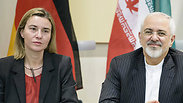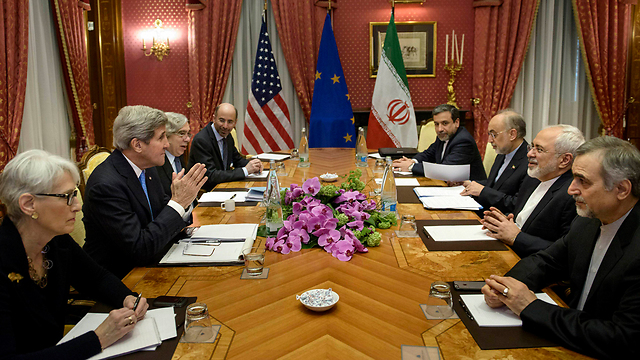
Netanyahu: World should be negotiating 'better deal' on Iran nuclear program
PM says such a deal would 'significantly roll back Iran's nuclear infrastructure' and link lifting of sanctions 'to a change in Iran's behavior.'
Prime Minister Benjamin Netanyahu on Wednesday repeated his strong opposition to the Iran nuclear agreement currently being drafted with world powers in Lausanne, saying that the international community should be negotiating a "better deal."
"The concessions offered to Iran in Lausanne would ensure a bad deal that would endanger Israel, the Middle East and the peace of the world. Now is the time for the international community to insist on a better deal," the prime minister said from his office in Jerusalem, echoing his speech to the US Congress last month.
"A better deal would significantly roll back Iran's nuclear infrastructure. A better deal would link the eventual lifting of the restrictions on Iran's nuclear program to a change in Iran's behavior," the prime minister said.
"Iran must stop its aggression in the region, stop its terrorism throughout the world and stop its threats to annihilate Israel. That should be non-negotiable and that's the deal that the world powers must insist upon."
He accused the world powers of turning a blind eye to what he said was the fact that Iran's actions contradicted its claims of only seeking peaceful nuclear power.
"I agree with those who have said that Iran's claim that its nuclear program is only for peaceful purposes doesn't square with Iran's insistence on keeping underground nuclear facilities, advanced centrifuges and a heavy water reactor,:" Netanyahu said.
"Nor does it square with Iran's insistence on developing ICBMs and its refusal to come clean with the IAEA on its past weaponization efforts. At the same time, Iran is accelerating its campaign of terror, subjugation and conquest throughout the region, most recently in Yemen."
Netanyahu also condemned the fact that the talks were going on even as the commander of the Iranian Basij militia said Tuesday that erasing Israel off the map was “non-negotiable.”
"Yesterday an Iranian general brazenly declared, and I quote: 'Israel's destruction is non-negotiable', but evidently giving Iran's murderous regime a clear path to the bomb is negotiable. This is unconscionable," Netanyahu said.
Netanyahu has repeatedly blasted the framework agreement being drafted, saying Sunday that the developing agreement was even worse than Israel had feared and the "Iran-Lausanne-Yemen axis" must be stopped.
Meanwhile, French Foreign Minister Laurent Fabius said Wednesday that negotiations have progressed, but not enough for an immediate deal.
The foreign ministers of Iran and Russia were optimistic early Wednesday that a preliminary nuclear agreement could be reached by the end of the day, while Western negotiators were more cautious.
Russian Foreign Minister Sergei Lavrov said negotiators had reached a general accord on "all key aspects", according to Russia's TASS news agency, while his Iranian counterpart said a draft agreement could be prepared on Wednesday.
But a diplomat close to the talks denied that such an agreement had been reached, and a French official said Fabius was leaving the talks and would return from France when it was "useful".
Meanwhile, China's Foreign Minister Wang Yi has reported "significant progress" in the core issues around the talks on Iran's nuclear program.
"It should be said that the thinking of a solution is clear, the positions of the parties are closer to one another, there is significant progress in the core issues," said Wang, according to a statement on the foreign ministry's website.
Wang outlined a four-point plan: calling on parties to strengthen their political leadership, meet each other halfway, divide the process into phases and consider "all-inclusive" plans to resolve the issue.
"All parties should display creative thinking and consider all-inclusive resolution plans," Wang said. "I want to emphasise, it is necessary to consider all parties' core concerns and it is extremely important to allow the UN Security Council to play its role."
Six world powers and Iran missed a Tuesday deadline to reach an outline accord reining in Tehran's nuclear program, extending talks into an extra day as they edged toward a deal but failed to agree crucial details such as the lifting of UN sanctions.
The negotiators ended talks in the Swiss city of Lausanne in the early hours of Wednesday and said they would reconvene later in the day.
The preliminary deal is a major milestone toward a final accord, with an end-June deadline, that could end the 12-year-old standoff and reduce the risk of another Middle East war.
With Iran asserting its "nuclear rights" and the United States threatening on Tuesday to abandon the negotiations, the talks have been bogged down on the issues of nuclear research, the lifting of UN sanctions and their restoration if Iran breaches the agreement.
The six powers - the United States, Britain, France, Germany, Russia and China - aim to stop Iran from gaining the capacity to develop a nuclear bomb in exchange for easing international sanctions that are crippling its economy.
Iran says its nuclear program is peaceful.
The US administration of President Barack Obama had committed to meeting a March 31 deadline for the outline political accord.
Negotiators have a tentative agreement on the rough outline of a possible public statement on the progress they have made so far that would also highlight areas of disagreement, diplomats close to the talks said. But they have not agreed on all the key details central to a political framework that would form the basis of a future nuclear agreement, the diplomats said.
Parts of any understanding reached by the parties will likely remain confidential for the foreseeable future.
Failure to agree a detailed preliminary accord would add to skepticism in the Republican-controlled US Congress over an emerging deal. Congress has warned it will consider imposing new sanctions on Iran if there is no agreement this week, giving an added sense of urgency to the talks.
A Democrat, Obama has threatened to veto any sanctions moves by the Republican-controlled Congress.
Officials cautioned that any accord would be fragile and incomplete, but the US State Department gave the go-ahead for talks to go past a self-imposed midnight deadline.
Lavrov was quoted by TASS as saying that the possible agreement included the International Atomic Energy Agency's control over Tehran's nuclear program as well as steps to lift sanctions. He added experts would work out technical details by end-June.
"One can say with enough confidence that (foreign) ministers have reached a general agreement on all key aspects of a final settlement to this issue," he said. "It will be put down in writing over the next few hours, maybe during the day."
The State Department said earlier in a statement that while enough progress had been made to extend the talks into Wednesday, "there are several difficult issues still remaining."
A senior Iranian negotiator said Tehran was willing to negotiate until the deadlock was resolved.
"Iran does not want a nuclear deal just for the sake of having a deal, and a final deal should guarantee the Iranian nation's nuclear rights," the negotiator, Hamid Baidinejad, told reporters.
White House spokesman Josh Earnest said in Washington that US negotiators would not wait until June 30 to walk away from the talks if they could not reach a preliminary political agreement.
"If we're not able to reach a political agreement, then we're not going to wait ... until June 30 to walk away," he said.
In Washington, US President Barack Obama held a video teleconference with members of his national security team and the US negotiating team in Lausanne to discuss the progress of nuclear negotiations with Iran, the White House said.
Obama was briefed by Secretary of State John Kerry and Secretary of Energy Ernest Moniz and other members of the American negotiating team. Vice President Joe Biden, Secretary of Defense Ashton Carter and National Security Adviser Susan Rice all participated in the meeting.
Speaking in Berlin with German Chancellor Angela Merkel, French President Francois Hollande said it would be better to have no deal than a bad deal.
An agreement would almost certainly lift sanctions only in stages, deferring even a partial return of Iranian crude exports until at least 2016.
Sanctions have halved Iran's oil exports to just over 1 million barrels per day since 2012 when oil and financial sanctions hit Iran. Brent crude dropped towards $55 a barrel on Tuesday as negotiations proceeded.
Sticking points
Officials from both sides said the main sticking points were the removal of the UN sanctions, their reversibility and Iranian demands for the right to unfettered research and development into advanced nuclear centrifuges after the first 10 years of the agreement expires.Officials said Iran was still demanding the lifting of all UN sanctions and that they not be automatically reinstated without further negotiations. Officials have said Britain, France and the United States want any removal of UN sanctions to be automatically reversible, but the Russians dislike this because it would weaken their veto power over the deal.
The six powers want more than a 10-year suspension of Iran's most sensitive nuclear work. Their goal is to find a way to ensure that for at least the next 10 years Iran is at least one year away from being able to produce enough fissile material for an atomic weapon.
Iran said the main issue was lifting sanctions quickly. "There will be no agreement if the sanctions issue cannot be resolved," Majid Takhteravanchi, an Iranian negotiator, told Iran's Pars news agency.
In Jerusalem, Prime Minister Benjamin Netanyahu reiterated Israel's concern that an agreement would fall short of guaranteeing its safety.
The framework agreement would leave Iran with the capability to develop a nuclear weapon in under a year, said Netanyahu.












